MOSCOW, March 4 -- Russia on Monday refuted NATO's allegations that Moscow was conducting military escalation in Ukraine's southern Crimea region, calling for an "essentially new form of behavior" on the part of its partners.
"We categorically disagree with the statement of the NATO Council on March 2 which accused the Russian Federation of military escalation in Crimea in breach of international law," the Russian Foreign Ministry said in a statement.
Military escalation would not stabilize the situation in Ukraine, but encourage forces that had planned to take advantage of the crisis for achieving their "irresponsible political goals," the statement said.
The ministry stressed that the sole source of the current threats to Ukraine's sovereignty and territorial integrity was the internal political crisis in the country.
The Ukrainian crisis, which originated from protests against President Viktor Yanukovych's decision last November to put on hold an association agreement with the European Union to get Russian aid, took an abrupt turn in the past two weeks following bloody clashes between protesters and police. Yanukovych was ousted by the parliament and had to flee to Russia. ' The mostly Russian-speaking Autonomous Republic of Crimea is now the epicenter of the ongoing crisis. Some 50 armed men carrying Russian navy flags took control of two airports in the Crimean capital of Simferopol on Friday, one day after gunmen seized the local parliament and government buildings.
Interim Ukrainian Interior Minister Arsen Avakov said on his Facebook page Russian naval forces, which have a base on the Crimean peninsula, were behind the seizure of the two airports.
But Russia denied any involvement. "Providing security for fleet facilities and preventing possible attacks on our compatriots from extremists and radicals are the sole purposes of all troop movements," the Foreign Ministry said, adding that NATO's statements are harmful for the bloc's relations with Russia.
Moscow's UN envoy Vitaly Churkin told a UN meeting Monday that Yanukovych had asked Russian President Vladimir Putin to use armed forces to restore "the rule of law, peace, order, stability and to protect the people of Ukraine."
Neither Putin nor other Russian leaders ruled out the possibilities of using military forces, after Putin got a green light Saturday from the parliament.
Sergei Naryshkin, speaker of the State Duma, or the lower house of Russia's parliament, said there was no need to send Russian troops to Ukraine "so far."
Naryshkin said an opportunity to settle the situation in Ukraine via a political dialogue still exists. "I and my colleagues do not even want to say the word 'war,'" he said.
Russian Foreign Minister Sergey Lavrov said at a UN Human Rights Council session in Geneva Monday that Ukraine should return to an agreement signed last month by Yanukovych to hold early elections and surrender some powers.
"Instead of a promised national unity government," Lavrov said of the new administration in Kiev, "a government of the victors has been created."
Lavrov also criticized threats of sanctions and boycotts over Moscow's role in the Ukraine crisis.
"Those who try to interpret the situation as a type of aggression and threaten sanctions and boycotts, are the same who consistently have encouraged (Ukrainians to) refuse dialogue and have ultimately polarized Ukrainian society," Lavrov told the meeting.
Ukrainian authorities said the Russian troops had issued an ultimatum for two of the country's besieged warships to surrender and deployed 16,000 troops in Crimea.
In response, the U.S. Defense Department said it was suspending exercises and other activities with the Russian military after the Obama administration was examining "a whole series of" economic and diplomatic steps to "isolate" Russia.
The European Union (EU) also mulled "targeted measures" against Russia due to the situation in Ukraine.
"In the absence of de-escalating steps by Russia, the EU shall decide about consequences for bilateral relations between the EU and Russia, for instance suspending bilateral talks with Russia on visa matters as well as on the New Agreement, and will consider further targeted measures," EU foreign policy chief Catherine Ashton told a press conference Monday after an extraordinary EU foreign ministers' meeting.
Global market reacted furiously to the Ukraine crisis. On Wall Street, both the Dow Jones industrial average and the Nasdaq composite closed sharply down, while oil prices rose on fears that Russia, a major oil exporter, might face sanctions. In European trading, gold rose while the euro and stock markets fell.
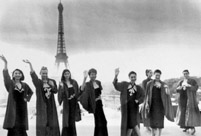 Old photos: Precious moments in Sino-French ties I
Old photos: Precious moments in Sino-French ties I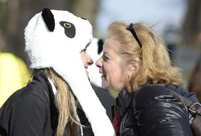 Belgians warmly welcome arrival of China's giant pandas
Belgians warmly welcome arrival of China's giant pandas Photos: Top 10 pure beauties in showbiz
Photos: Top 10 pure beauties in showbiz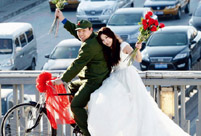 Chinese Dream: the Chinese Spirit and the Chinese Way
Chinese Dream: the Chinese Spirit and the Chinese Way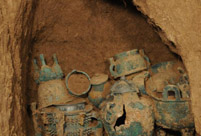 51 bronze sacrificial utensils unearthed in Shaanxi
51 bronze sacrificial utensils unearthed in Shaanxi Most gorgeous female celebs in Chi-pao
Most gorgeous female celebs in Chi-pao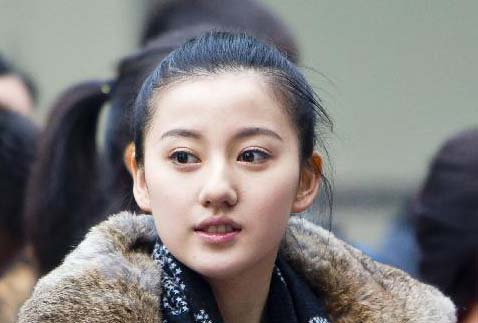 Second round of test kicks off at Beijing Film Academy
Second round of test kicks off at Beijing Film Academy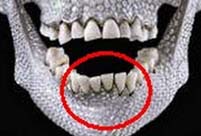 Ancient Qiang people had vertically grown teeth
Ancient Qiang people had vertically grown teeth Top 10 Chinese youth’s favorite seaside destinations
Top 10 Chinese youth’s favorite seaside destinations Sacrificial altar unearthed in China's Shannxi
Sacrificial altar unearthed in China's Shannxi Chinese warplanes C919 to appear at Singapore Airshow
Chinese warplanes C919 to appear at Singapore Airshow North China Sea Fleet conducts anti-submarine drill
North China Sea Fleet conducts anti-submarine drill Ruins of Shang Dynasty's structure unearthed in Shaanxi
Ruins of Shang Dynasty's structure unearthed in Shaanxi  Stunning figure skating in Sochi
Stunning figure skating in Sochi Intercity high speed train in operation
Intercity high speed train in operationDay|Week|Month